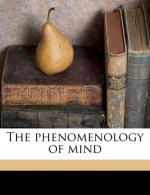
|
| Name: _________________________ | Period: ___________________ |
This test consists of 5 multiple choice questions, 5 short answer questions, and 10 short essay questions.
Multiple Choice Questions
1. According tio Hegel where do psychological laws originate?
(a) In the concrete reality of the self.
(b) In the failure of the power of observation.
(c) In the fulfillment of self-consciousness.
(d) In self-reflection.
2. What is the purpose of Hegel's treatise?
(a) To cultivate the scientific mind.
(b) To prove the existence and thoughts of God.
(c) To disprove the need for religion.
(d) To dispel superstition.
3. How else do the inner and outer relate, besides being opposites according to Hegel?
(a) The inner is also dependent on the outer.
(b) The outer is also dependent on the inner.
(c) They are also complementary.
(d) They are also mutually dependent.
4. What do both parts of a lordship/bondage relationship seek in Hegel's philosophy?
(a) Self-certainty of consciousness.
(b) The elimination of the other.
(c) Equilibrium.
(d) Dominance.
5. According to Hegel, for what purpose are Unity, Difference and Relation all necessary?
(a) For the development of self-reflection.
(b) For the evolution of man.
(c) For the reconciliation of man with himself.
(d) For the development of consciousness.
Short Answer Questions
1. What else must an individual conquer in order to manifest individuality according to Hegel?
2. According to Hegel, what are the mind's two relations to reality?
3. What causes the formation of laws according to Hegel?
4. What were both phrenology and cranioscopy looking for?
5. What is it that indicates something about a person's unique traits, in Hegel's account?
Short Essay Questions
1. How does Hegel define determinateness?
2. What are the components of a "concrete individuality" in Hegel's terminology?
3. What does Hegel mean by saying that consciousness is relational?
4. How can the individual's truths be realized, according to Hegel's philosophy?
5. What are the stages by which the conscious mind develops, in Hegel's terminology?
6. How, in Hegel's view, does the self become aware of the contradiction of selfhood?
7. What distinction does the translator Baille draw between "the fact of the matter" and "a matter of fact"?
8. How does Hegel define the relationship between the lord and the servant?
9. What does "concrete" mean in Hegel's terminology?
10. Where do laws come from in Hegel's philosophy?
|
This section contains 858 words (approx. 3 pages at 300 words per page) |

|




